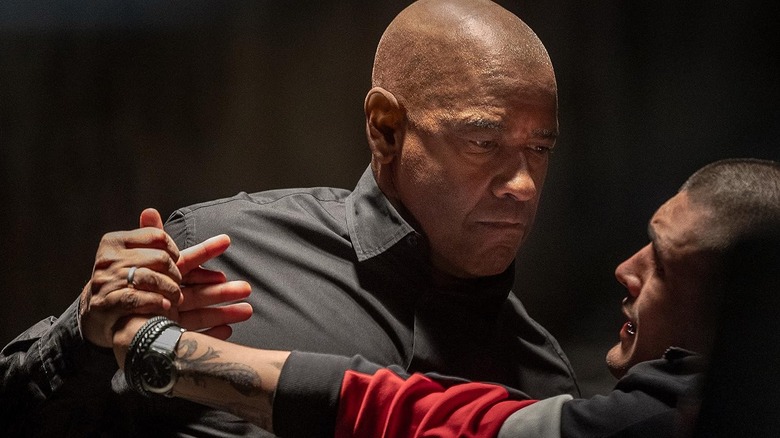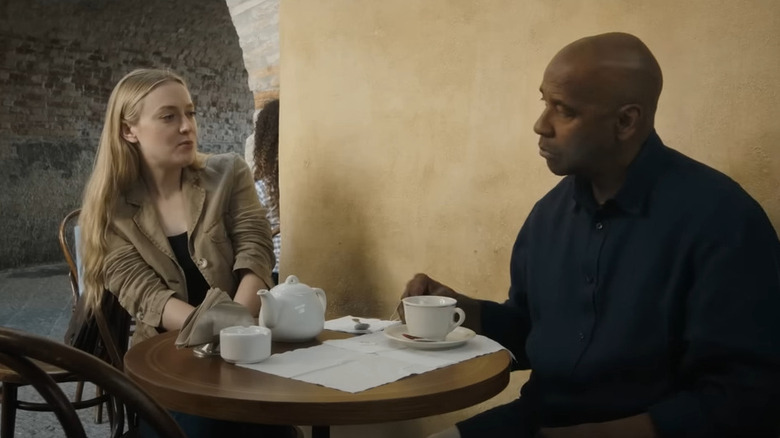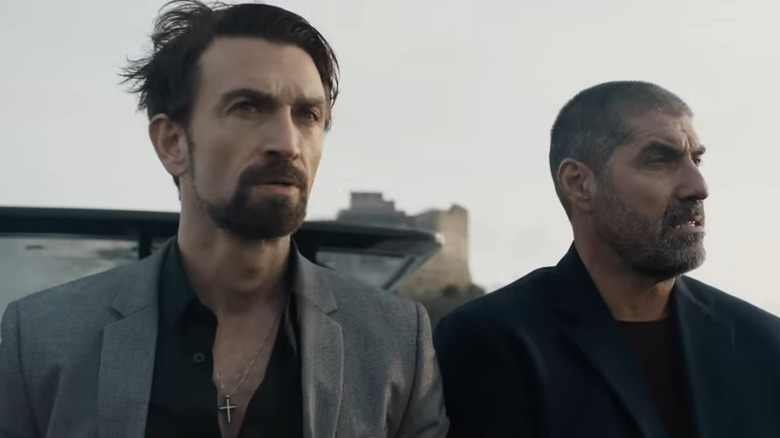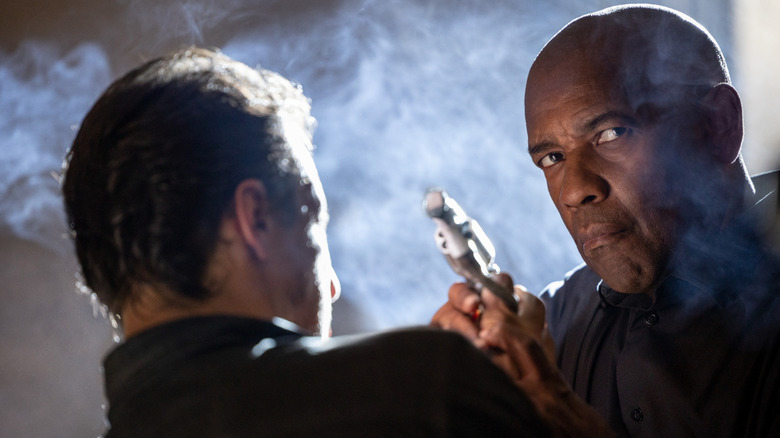The Equalizer 3 Review: This Unsophisticated Actioner Has Some Rad Violence
In Antoine Fuqua's 2018 film "The Equalizer 2," Robert McCall (Denzel Washington) spent just as much time engaging in civic rebuilding activities as he did slashing criminal throats. He scrubbed graffiti off of the walls of his Boston tenement, read Proust, and handed a reading list — including Ta-Nehisii Coates' "Between the World and Me" and W.E.B. DuBois' "The Souls of Black Folk" — to a neighboring at-risk teen (Ashton Sanders from "Moonlight"). It was a film just as much about righteous indignation as it was about kicking ass and cathartic murder. It was an action film for the Trump era, depicting a strictly moral assassin attacking wealthy white frat bros (one gets his neck cut open by the sharpened edge of his own credit card).
Fuqua's and Washington's 2023 follow-up "The Equalizer 3," purportedly the final film in the series, takes a simpler tack. McCall's superheroism is now inspired less by a sense of being ethically compelled, and more by a traditional sense of action movie "steely determination."
"Equalizer 3" sees a slightly older Robert McCall taking on the Camorra, a smaller-scale mafia, in a quaint Sicilian town only a few clicks over from — and more drearily photographed than — the idyllic seaside village from "Luca." McCall is there to chew bubblegum and stab gun barrels directly into the eye sockets of Italian bad guys ... and he's all out of bubblegum. Fuqua has always had a knack for filming exhilarating, brutal violence — and he certainly doesn't skimp on the blood in "The Equalizer 3" — but this closing chapter, in lacking the previous two films' palpable outrage, feels less substantial.
It's a light mercy, then, that Washington has become so comfortably capable in this role and working for this director.
The civic-minded action hero
And luckily, what "Equalizer 3" lacks in moral umbrage, it more than makes up for in clarity and efficiency. Unlike in the previous two movies, "Equalizer 3" is content to be straightforward and even a little fun. There is a certain puerile glee in witnessing Washington's unflappable, stoic, conventional-action-hero confidence propped up in the face of snarling, tattooed mafia brats. Clarity is often in short supply in Fuqua's filmography — the dude loves his hazy, gritty photography — so any actual spatial continuity is appreciated.
After an introductory sequence wherein McCall lays waste to an entire villa stuffed with armed baddies (it's in this sequence wherein a mafioso will be stabbed to death with a gun barrel), McCall is left with a bullet wound in his back. He is discovered by a helpful local dottore (Remo Girone) who is just as skilled at removing bullets as he is at not asking questions. The next 45 minutes of the film involves McCall's slow and gradual recovery, allowing him to wander the cobblestone streets of his small Italian hamlet. Just like the first two "Equalizers," this chapter has a lot of quiet moments and downtime in between the bouts of mayhem. In flirting with the local waitress (Gaia Scodellaro), enjoying tea at the local caffè, and bonding with the local fishmonger, McCall begins to feel that he, too, would like to be local. He even begins calling himself Roberto. Our hero, after a life of vigilante violence, may very well retire to the Italian countryside.
But not without first taking out the trash. Naturally, there are bad guys who require some light killing before true peace can set in.
Fuqua's ugly photography
The heavy of "Equalizer 3" is a local mob boss named Vincent (Andrea Scarduzio), and he's as growlingly generic as they come. His sharp features and gravely voice are all the audience really requires to establish his villainhood. Vincent has been muscling the village merchants out of their stores in an effort to build out his empire and transform Sicily into a garish gambling center. This is the stuff that Saturday morning cartoons are built on. Denzel Washington seems to have been handed the lion's share of the film's charisma allotment.
Washington is reunited with his "Man on Fire" co-star Dakota Fanning, who plays a CIA desk jockey called in to represent law and order. It is an injustice that a talented actress like Fanning is saddled with some of the most blandly efficient dialogue one might find in a crime thriller. Indeed, several of her lines are just repeats of what McCall had said earlier in the film. It's a pity she wasn't permitted to give her character some personality.
Fuqua, generally speaking, tends to shy away from organic quirk and moments of genuine warmth and humanity. He likes to make movies about stone-hearted criminals or righteous vigilantes, usually living in blank, run-down worlds without sunlight or — from the look of his consistently abysmal photography — breathable air.
Fuqua has worked with multiple cinematographers in his career, most often with Mauro Fiore ("Avatar") who shot six of his films. For "Equalizer 3," Fuqua worked with three-time Oscar winner Robert Richardson ("JFK," "Hugo," "The Hateful Eight"), and it's the worst-looking film Richardson has ever shot. Outdoor scenes are clouded and sapped of sunlight, giving everything a frustrating visual patina that saps the film of any sense of engaging humanity.
Arms-length
This has long been an issue with Fuqua's filmmaking style, going all the way back to "The Replacement Killers" in 1998. Fuqua came from the world of music videos (he directed Coolio's "Gangsta's Paradise" and Prince's "The Most Beautiful Girl in the World"). Even decades into a varied feature-making career, he struggles to find an appealing cinematic aesthetic free from the Vaseline-coating of 1990s MTV. He is a better aesthetician than a storyteller. And even then, he's wildly inconsistent. For the love of Pete, don't watch his 2021 film "Infinite."
Fuqua's greatest strength, however, seems to be his relationship with Washington. "Equalizer 3" is their fifth film together, with two of those films being the only sequels Washington has ever appeared in. Fuqua and Washington seem to have formed an easy, understanding working relationship, and the actor, likely as a result, appears assured, confident, and never out of his element. When McCall, even in his late 60s, threatens a lupine Camorra twerp, the audience can grin in anticipation of imminent badass violence. Some of the best moments of "Equalizer 3" are the ones that fall just before a confrontation, with McCall declaring his victory more or less already won.
Those and the violence. There's some pretty rad violence in the flick. The villain's eventual comeuppance is poetic and lightly delicious.
The canon of "The Equalizer" has never taken the world by storm, usually percolating in the background of popular culture as a piece of intense ephemera. Robert McCall is a former Marine and DIA officer, but that is entirely ignored in part 3. He's a superhero played by Denzel Washington, and the filmmakers assume that is enough. For many audience members, it will be.
/Film Rating: 6.5 out of 10



